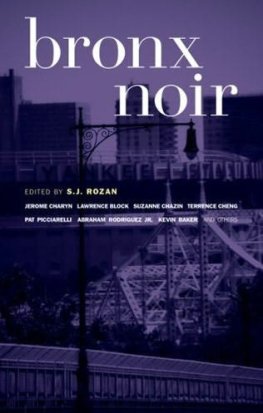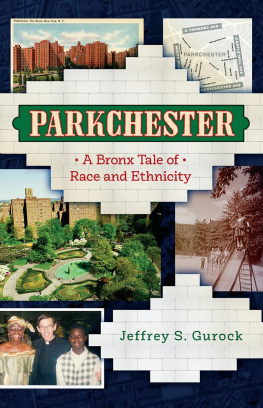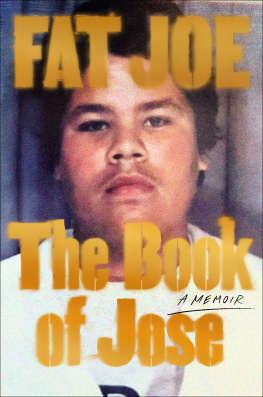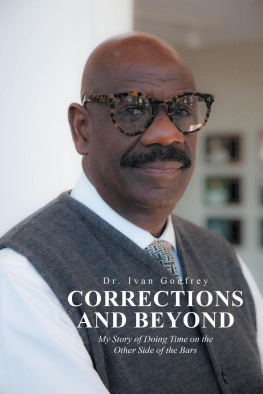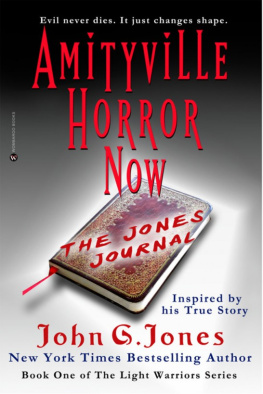THE RAT THAT GOT AWAY
THE RAT THAT GOT AWAY
A BRONX MEMOIR
ALLEN JONES
with Mark Naison

Copyright 2009 Fordham University Press
All rights reserved. No part of this publication may be reproduced, stored in a retrieval system, or transmitted in any form or by any meanselectronic, mechanical, photocopy, recording, or any otherexcept for brief quotations in printed reviews, without the prior permission of the publisher.
Fordham University Press has no responsibility for the persistence or accuracy of URLs for external or third-party Internet websites referred to in this publication and does not guarantee that any content on such websites is, or will remain, accurate or appropriate.
Library of Congress Cataloging-in-Publication Data
Jones, Allen, 1950
The rat that got away : a Bronx memoir / Allen Jones with Mark Naison.1st ed.
p. cm.
ISBN 978-0-8232-3102-7 (cloth : alk. paper)
1. Jones, Allen, 1950Childhood and youth. 2. Bronx (New York, N.Y.)Biography. 3. New York (N.Y.)Biography. 4. African American young menNew York (State)New YorkBiography. 5. Public housingNew York (State)New YorkHistory20th century. 6. Drug dealersNew York (State)New YorkBiography. 7. Bronx (New York, N.Y.)Social life and customs20th century. 8. Preparatory school studentsMassachusettsGreat Barrington (Town)Biography. 9. African American basketball playersEuropeBiography. 10. African AmericansLuxembourgBiography. I. Naison, Mark, 1946II. Title.
F128.68.B8J64 2009
974.7275043092dc22
[B]
2009014583
Printed in the United States of America
11 10 09 5 4 3 2 1
First edition
Contents
Photographs follow
Preface
Before I begin my story, I would like to offer a few words about how I came to write this book.
When I passed my 50th birthday, I found myself trying to understand how I had ended up in a safe and secure job 4,000 miles from where Id grown up. I was doing my nine-to-five job and staying out of trouble, but I was starting to wonder whether my life had a higher purpose. Why had I been saved from the potentially fatal consequences of all the terrible things that I had done? Why had I chosen to live in Europe, far away from friends and family? My questions were versions of the one that everybody eventually asks: Why am I here? I asked the Lord to give me a sign so that I would understand better where I had come from and know the direction I ought to go in at this juncture in my life. I had been taught by my faith long ago that signs are all around us: The challenge is to read them correctly.
A sign did come, but from an unexpected source. Over the years, the one person from the neighborhood I kept in touch with was Michael Singletary. One day, Mike mentioned in one of our phone conversations that he had been contacted by Dr. Mark Naison, a professor of African-American studies at Fordham University in the Bronx, who was doing research on the people who grew up in the Patterson Houses during the 1950s and 1960s. On Mikes recommendation, I e-mailed Professor Naison. As we wrote back and forth, I came to realize that he and I had lived through many of the same life events and that we felt the same love of sports, music, and city streets. The only difference was that he had come at life from the white side and I had lived it on the black side.
Once I started telling Mark my story, I saw that it had a powerful effect on him, and the idea came to me that I needed to write what I had experienced in a book for others to read. This story is worth telling for a lot of reasons, but the most important one to me is that it might help some of the brothers or sisters who read it to see possibilities in their own lives that they never imagined. Sometimes all it takes is a word or two of encouragement to help you change your direction.
When I told Mark this, he sent me a copy of his book, White Boy: A Memoir. After I read it, I felt sure that the Lord wanted me to pass on the knowledge I had gained from my life. As it turned out, writing this book has been as helpful to me as I hope it will be to my readers: It gave me a chance to grapple with my own inner demons and to make sense of the life I have lived. Although I sometimes use a street dialect to express myself, do not assume that my mind is still ruled by the law of the streets. If that were the case, I would not be writing this book from the other side of the world. But the language of the street speaks its own reality, and its one way Ive been able to keep the story real.
When it came time to give a title to this book, I didnt have to think for very long: The eventual title, The Rat That Got Away, is a phrase that I first heard 35 years ago, and it seems its been waiting in the back of my mind all this time for me to use it. The name was given to me by an older sister from the Patterson Houses in the summer of 1969. One night after practicing street ball in my neighborhood, I stopped in a small bar just off Webster Avenue to get a cold drink. I walked up to a heavyset black woman behind the bar and asked her to give me a Coke. We recognized each other from the Projects; her name was Christine. As she handed me my drink, she asked me: What are you doing for yourself, brother? I knew better than to tell her that I had just come out of Rikers Island, which was true but a fact that belonged to the past. Instead, I told her the good news I had just learned: that I had won a basketball scholarship to a private prep school in New England and that Id be leaving the neighborhood in the fall. She looked at me, smiled even more broadly, and said, Good for you, honey! You the rat that got away!
That phrase has stuck in my mind ever since. It expresses how I see myself and who I really am.
All the signs are now in place: I know I was destined to write this book. I hope my story will help readersespecially the young brothers and sisters still trying to make a living in the streetsto understand how I overcame the obstacles in my path and ended up living a full and productive life when I could have easily ended up dead or in jail. If this book encourages even one person to examine his or her own life, to keep the faith, and to find a sense of direction, it will have been well worth the effort.
Peace, my brothers and sisters, from the other side of the world.
Introduction
MARK NAISON
The Rat That Got Away is the story of an extraordinary person who has lived an even more extraordinary life. Allen Jones grew up in the Lester Patterson Houses in the Bronx in the 1950s. Brought up in an intact, loving family and encouraged in his basketball career by community mentors, Jones nevertheless felt a strong attraction to life in the streets. When a heroin epidemic swept through the Bronx in the 1960s, Jones, a teenager at the time, could not resist participating in it, both as a user and a dealer, and soon found himself living a double life. Arrested for armed robbery, Jones spent four months on Rikers Island awaiting trial, only to be released on probation into the custody of his parents by a sympathetic judge. Fearful of being pulled back into the drug business, Jones was rescued yet again, a few months later, by his basketball mentors, who got him a full scholarship to a New England prep school. From there, Joness basketball skills took him to a junior college in North Carolina, to a small liberal arts college in Virginia, and ultimately to a professional basketball career in Europe that lasted more than 15 years. Seeking the financial security and economic opportunities he could not find in the United States, Jones created a niche for himself as a coach, a radio personality, and a banker in Luxembourg after his professional basketball career ended. Today, Jones, who has recently retired on disability, lives a comfortable life in a country far from the streets he grew up in. The story of his remarkable escape from a life dominated by drugs and illegal activitya life involving repeated brushes with death, despair, and disasterto one characterized by athletic excellence, professional accomplishment, and financial prosperity is the subject of the fascinating and inspiring story that follows.
Next page

